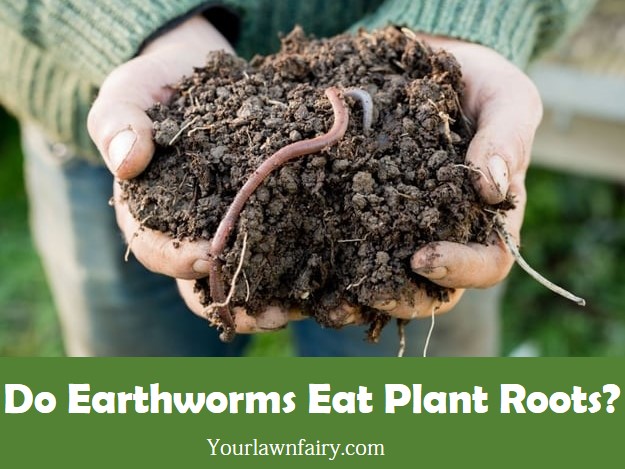Are you looking for a way to improve your garden’s soil health and make your plants grow more quickly? Earthworms are the answer!
Earthworms are the unsung heroes of your garden, and they do a lot of good work.
They help to break up soil clumps, increase aeration and drainage, improve nutrient availability, and even add organic matter to your soil. That’s right earthworms can be used as composters!
But there’s one thing that many people wonder about: do earthworms eat plant roots? Well, the answer isn’t quite as simple as “yes” or “no.” So let’s dig in!
Earthworms don’t actually seek out root systems, they prefer dead leaves or other organic matter that has fallen into the soil.
When earthworms eat plant roots, it’s usually because there wasn’t enough organic material for them elsewhere in the soil.
Do Earthworms Eat Plant Roots?
Earthworms don’t eat plant roots directly, but they may ingest them accidentally!
Earthworms live in tunnels through the soil, where they feed on decaying organic matter and bacteria.
When an earthworm eats these materials, it digests them within its body and excretes waste products from this process through its skin.
This can include bits of root material that are accidentally consumed by the worm as it moves through its tunnel system.
However, this does not mean that earthworms are actively seeking out root material to consume, they’re just eating what happens to come into contact with their bodies while they’re doing their normal tunneling activities and digesting food sources.
What Are Earthworms and What Do They Eat?
Earthworms are segmented worms that live in the soil. They’re typically between 3 and 10 inches long, although there are some species that grow over a foot long.
Earthworms have a soft body with no external skeleton. This means they can squeeze into tiny spaces in the soil where their bodies are protected from predators.
The most common type of earthworm is the common garden earthworm (Lumbricus terrestris).
These worms live in the top 6 inches of soil and eat decaying organic matter like leaves, dead animals, and other plant material. Some types of earthworms also eat soil minerals or bacteria in the soil.
Can Earthworms Be Beneficial to Your Plants?
Have you ever noticed that when you dig up an earthworm from the ground, it feels slimy and squishy?
The truth is that earthworms are full of slime. This is because they need to be able to move through the soil without getting stuck. They also have a fluid-filled body which helps them to do this.
As you might imagine, earthworms need moisture in order to survive. They can’t live in areas where there is too much or too little water, so they are usually found in places where there is just enough moisture for them. In fact, they can live underwater if necessary!
Earthworms are actually very beneficial creatures because they help break down organic matter into soil nutrients which plants can use. When they move through their tunnels underground, they bring up bits of dirt and plants roots along with them which means these nutrients are now available for plants to absorb through their roots!
How Do Earthworms Help Your Garden?
Earthworms are great at breaking down organic matter.
This is important because it means you don’t have to buy fertilizer so often, and it helps your plants get all the nutrients they need without having to spend money on synthetic fertilizers.
This process is called “vermicomposting,” and it happens when earthworms eat the organic material in your soil and then excrete it as castings (which are basically just their poop).
So what does this mean for you? It means your plants get all the nutrients they need from their own castings instead of having to rely on synthetic fertilizers!
That’s a huge win for both you and the environment.
What do earthworms do?
Earthworms are incredible creatures. They’re actually responsible for a lot of the soil that we take for granted.
Earthworms burrow through the soil, mixing it up and aerating it. This helps to make sure that plants can get the nutrients they need, because the soil is more porous.
In addition to making sure that plants have access to nutrients, earthworms help to keep soil healthy by recycling it.
They eat organic matter and then excrete it as worm castings which are basically little balls of dirt that contain lots of nutrients!
Do earthworms hurt the soil?
No, earthworms donot hurt the soil, infact they are good for the soil.
Earthworms are actually very beneficial to the soil, and they don’t hurt it at all. In fact, earthworms help to break down organic material in the soil, which helps to improve the nutrient content and aeration of that soil.
By eating organic matter in the soil, earthworms can help to increase its fertility.
Earthworms also help to increase water retention in clay soils by keeping them open and porous.
This means that crops planted in these soils will require less watering than if they were planted in unamended soils without worms present.
How many worms are too many?
You don’t want too many worms in your garden because they can eat all of your plants’ nutrients before other plants get a chance to use them.
If you notice that you have a lot of worms in your garden, try adding more compost or using mulch so that there will be fewer leaves for them to eat and plant roots that won’t be exposed above ground level where they can be eaten by other worms or animals like birds or rabbits!
Conclusion
We hope you found this blog post helpful and thought-provoking.
We’re always interested in hearing your thoughts, so feel free to reach out if you have any questions or comments. We’ll see you next time!
Also Read: Brasso Epidendrum Green Dragon | All You Need to Know About

